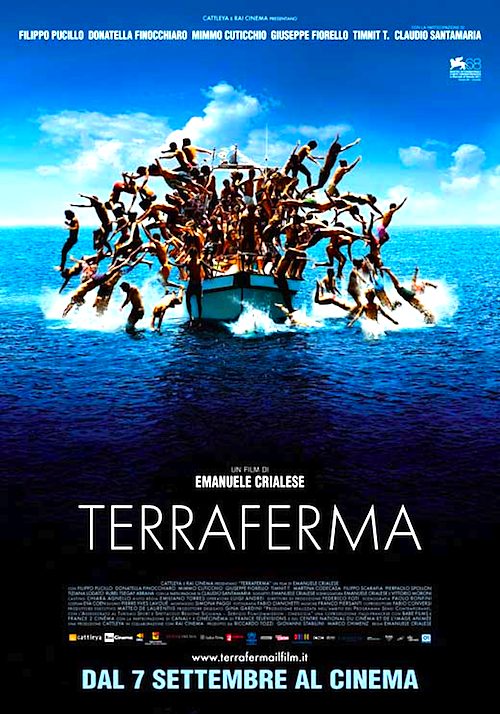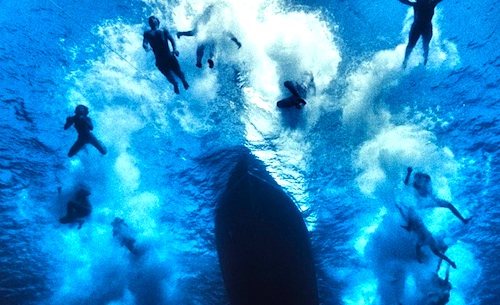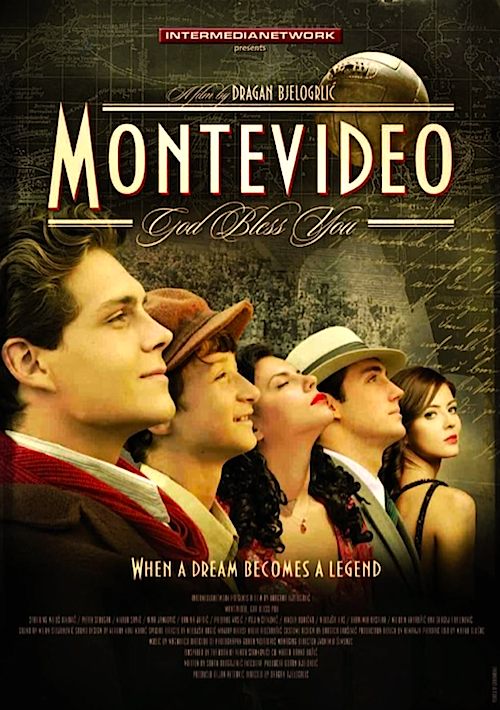 By Joe Bendel. The tiny Sicilian island of Linosa looks like a Mediterranean paradise. Unfortunately, regular work can only be found there two months out the year. In addition to tourists, illegal immigrants from North Africa have also been flocking to the isle, further complicating the local economy. Indeed, immigration is the driving concern of Emanuele Crialese’s Terraferma (trailer here), which has been officially submitted by Italy for Academy Award consideration as the best foreign language film of the year.
By Joe Bendel. The tiny Sicilian island of Linosa looks like a Mediterranean paradise. Unfortunately, regular work can only be found there two months out the year. In addition to tourists, illegal immigrants from North Africa have also been flocking to the isle, further complicating the local economy. Indeed, immigration is the driving concern of Emanuele Crialese’s Terraferma (trailer here), which has been officially submitted by Italy for Academy Award consideration as the best foreign language film of the year.
Filippo is not too bright, but the kid has not had a lot of breaks in life. After his father was lost at sea, his grandfather and uncle have waged a cold war over his future. The old salt-of-the-earth Ernesto wants Filippo to be a fisherman like his father before him, whereas the smarmy Nino offers his nephew seasonal work catering to tourists. Unsatisfied with either dead-end option for her son, Giulietta resolves to leave the island after the upcoming season, a decision that does not sit well with Filippo.
Even though Filippo remains determined to stay, a series of disparate new arrivals will challenge his family’s traditional way of life. First, his mother rents out their home to three tourists from the “dry land,” including the very noticeable Maura. Soon thereafter, Ernesto and Filippo fish out several drowning Ethiopians from the sea, secretly sheltering the pregnant Sara and her young son. For their efforts, Ernesto’s boat is confiscated. From this point on, Terraferma is not very subtle.
That water sure is blue, though. Not merely background color, the deep azure sea is a critically important visual element for the film. Crialese pointedly contrasts images of tourists playfully diving off pleasure cruisers with that of illegal immigrants desperately abandoning sinking makeshift vessels. It is heavy-handed, but striking.
Dazzlingly lensed by Fabio Cianchetti, Terraferma captures all the natural beauty of Linosa. He also evokes the chiaroscuro effect of old masters in several hushed scenes of good Samaritans ministering to the despised huddled masses. There are plenty of bikini shots as well, not that anyone will ever confuse the film with Beach Blanket Bingo.

Cianchetti’s camera also loves Mimmo Cuticchio, both an award winning puppeteer and an accomplished actor. Resembling a wiser, more weathered Andrew Weil, Cuticchio has the perfectly seasoned gravitas to serve as Ernesto, the film’s proletariat moral compass. Filippo Pucillo does not have any of that going on as his namesake. Granted, the twenty year-old is supposed to be immature, but one starts to wonder how he has gotten this far in life. Conversely, Donatella Finocchiaro plays mother Giulietta with a convincing world-weary earthiness, despite not looking particularly matronly. Former model Martina Codecasa also shows a bit of unexpected substance beyond mere eye candy as the topless sunbathing Maura.
Terraferma is mostly quite effective as a bit of fun in the sun with a guilty social conscience, though the spectacle of throngs of prospective asylum seekers overwhelming Filippo’s “borrowed” skiff like a horde of zombies nearly undermines the message. Regardless, it is an absolutely lovely looking film. Indeed, both the lush visuals and simplistic humanism ought to appeal both to Academy voters and to prospective distributors.
Posted on December 28th, 2011 at 8:57pm.

